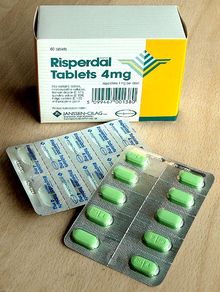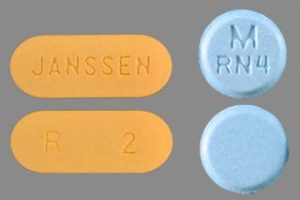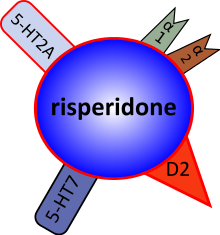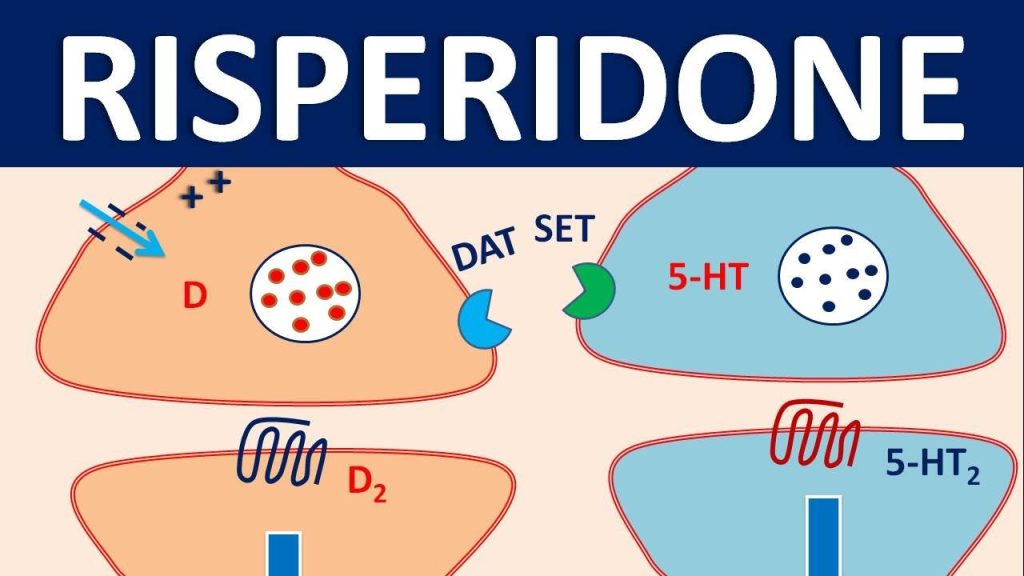Risperidone (trade name Risperdal) is a medication of the atypical antipsychotic class. It is mainly used to treat schizophrenia, bipolar disorder, and irritability associated with autism. This guide will provide you with the most important information about Risperidone that you should know before taking it.
Contents
Understanding Risperidone

Risperidone is a medication that belongs to the class of atypical antipsychotic drugs. It is mainly used to treat schizophrenia, bipolar disorder, and irritability associated with autism.
Atypical Antipsychotic Drugs
Atypical antipsychotic drugs are a newer type of medication used to treat schizophrenia and other psychiatric disorders. Furthermore, they were developed to address some of the problems associated with older, so-called “first generation” antipsychotic medications.
How Does It Work
Risperidone works by blocking certain receptors in the brain, called dopamine receptors. Dopamine is a chemical that is involved in transmitting signals between cells in the brain. Furthermore, it is thought that disruptions in the activity of dopamine may be responsible for some of the symptoms of schizophrenia and other psychiatric disorders.
Most Important Information I Should Know About Risperidone
Before taking risperidone, there are some things you should discuss with your healthcare provider. However, these include:
- Whether or not you are pregnant or plan to become pregnant: Risperidone should not be taken during pregnancy, as it may cause serious birth defects.
- Whether or not you are breastfeeding: Risperidone can pass into breast milk and may harm a nursing baby.
- Any other medical conditions you may have: Risperidone can cause serious side effects in some people with certain medical conditions.
Things Should I Discuss With My Doctor Before Taking Risperidone
Your healthcare provider will also want to know if you have ever had:
Liver problems: It can cause serious liver problems.
A seizure disorder: It may increase the risk of seizures.
Parkinson’s disease: It may worsen symptoms of Parkinson’s disease.
Dementia: It may increase the risk of death in people with dementia.
Allergies to medications: It can cause allergic reactions in some people.
Heart problems, including a heart attack or chest pain: It may increase the risk of heart problems.
High blood pressure or a history of high blood pressure: It may increase your blood pressure.
Low white blood cell count (a sign of a weakened immune system): It can cause a serious infection called neutropenia.
Problems with your metabolism, such as diabetes or high cholesterol: It can cause changes in your blood sugar and cholesterol levels.
A movement disorder caused by drugs like antipsychotics called tardive dyskinesia: May increase the risk of developing this disorder.
Thoughts of suicide or hurting yourself: It can increase the risk of suicidal thoughts and behavior in people who are younger than 25 years old.
Administering Risperdal

How Risperidone Is Available
Risperdal is available as a tablet, liquid, and disintegrating tablet that can be taken by mouth.
How Should I Take Risperidone
Your healthcare provider will tell you how much risperidone to take and when to take it. It is usually taken once or twice a day. Furthermore, the liquid form of risperidone can be given in a dose that is measured with an oral syringe.
What Happens If I Miss A Dose Of Risperidone
If you miss a dose of risperidone, take it as soon as possible. However, if it is almost time for your next dose, skip the missed dose and continue with your regular schedule. Furthermore, do not take two doses of risperidone at the same time.
If I Overdose With Risperidone
If you overdose on it, call your local poison control center or seek emergency medical attention.
Time Risperidone Takes To Work
It usually takes several weeks for it to work. However, your healthcare provider may want to continue treatment even after you feel better.
Things Should I Avoid While Taking Risperidone
There are some things you should avoid while taking risperidone. However, these include:
- Alcohol: Drinking alcohol while taking risperidone can cause serious side effects.
- Stopping risperidone suddenly: If you stop taking risperidone suddenly, you may experience withdrawal symptoms.
- Driving or operating heavy machinery: Risperidone may cause drowsiness and dizziness, which may impair your ability to drive or operate heavy machinery.
- Making sudden changes in your diet: Risperidone can cause a serious condition called hyperglycemia if you make sudden changes in your diet, such as eating more or less food than usual.
Evaluating Risperidone
Your healthcare provider will evaluate your response to risperidone and may adjust your dose or change your medication.
Possible Side Effects Of Risperidone
Common side effects
- Drowsiness
- Dizziness
- Nausea
- Vomiting
- Weight gain
- Changes in your blood sugar or cholesterol levels
- Movement disorders, such as tardive dyskinesia
Rare but serious side effects

Neutropenia: It can cause a serious infection called neutropenia. Neutropenia is a decrease in the number of white blood cells, which can make you more susceptible to infections. Thus, if you develop a fever or any signs of an infection (such as chills, sweats, shortness of breath, or chest pain), call your healthcare provider right away.
Liver Problems: It can cause liver problems, including hepatitis and jaundice (yellowing of the skin or eyes). Thus, if you develop any symptoms of liver problems (such as nausea, vomiting, abdominal pain, fatigue, loss of appetite, dark urine, light-colored stools, or itching), call your healthcare provider right away.
A Seizure Disorder: It can cause a seizure disorder. If you develop any signs of a seizure (such as jerking movements, loss of consciousness, confusion, or changes in your behavior), call your healthcare provider right away.
Heart Problems: It can cause heart problems, including a heart attack or chest pain. If you develop any symptoms of a heart problem (such as chest pain, shortness of breath, irregular heartbeat, or swelling of your feet or ankles), call your healthcare provider right away.
High Blood Pressure or a History of High Blood Pressure: It can cause high blood pressure. If you have a history of high blood pressure, be sure to tell your healthcare provider before taking risperidone.
Parkinson’s Disease: It can cause Parkinson’s disease. If you develop any signs of Parkinson’s disease (such as tremors, muscle stiffness, a decrease in your movement or facial expression, or changes in your speech), call your healthcare provider right away.
Dementia: It can cause dementia. If you develop any signs of dementia (such as memory problems, confusion, or changes in your behavior), call your healthcare provider right away.
Medications That May Interact With Risperidone
Risperidone may interact with other medications you are taking, including over-the-counter medications and supplements. Furthermore, it may interact with certain medications, including:
- Antipsychotic medications: It may increase the levels of antipsychotic medications in your blood. This could cause serious side effects.
- Benzodiazepines: It may increase the sedative effects of benzodiazepines.
- HIV medications: It may decrease the levels of HIV medications in your blood. This could make HIV resistant to treatment.
- Carbamazepine: It may decrease the levels of carbamazepine in your blood. This could make the seizure medication less effective.
- Lithium: It may increase the levels of lithium in your blood. This could cause serious side effects.
- Methyldopa: It may increase the levels of methyldopa in your blood. This could cause serious side effects.
- Opioids: It may increase the levels of opioids in your blood. This could cause serious side effects.
- Phenobarbital: It may decrease the levels of phenobarbital in your blood. This could make the seizure medication less effective.
- Tricyclic antidepressants: It may increase the levels of tricyclic antidepressants in your blood. This could cause serious side effects.
- Warfarin: It may decrease the effectiveness of warfarin, increasing the risk for bleeding.
NOTE: Be sure to tell your healthcare provider about all the medications you are taking, including prescription and over-the-counter medications, vitamins, and supplements.
Alternatives To Risperidone
There are other medications available to treat the symptoms of schizophrenia. If risperidone is not right for you, your healthcare provider may prescribe another medication. However, some common medications used to treat schizophrenia include:
- Aripiprazole (Abilify)
- Clozapine (Clozaril, FazaClo)
- Olanzapine (Zyprexa, Symbyax)
- Paliperidone (Invega)
- Quetiapine (Seroquel)
- Ziprasidone (Geodon, Zeldox)
Your healthcare provider will work with you to find the best medication for you.
Summary Of FDA Black Box Warnings
Risperidone has a boxed warning from the U.S. Food and Drug Administration (FDA). A boxed warning is the most serious type of warning that can be put on medication. The boxed warning for risperidone says that risperidone can cause a serious movement disorder called tardive dyskinesia. Tardive dyskinesia is a problem with muscle movements that can’t be stopped. It can occur in people who take antipsychotic medications, including risperidone, for long periods.
DISCLAIMER: The information in this article is not intended to be a substitute for professional medical advice, diagnosis, or treatment. Always seek the advice of your healthcare provider with any questions you may have regarding a medical condition.
Experts’ Opinion About Risperdal
Some experts believe that the benefits of risperidone outweigh the risks. They say that risperidone can be a helpful medication for people with serious mental illnesses. However, other experts believe that the risks of taking risperidone for long periods of time are too high. Furthermore, they think that people should only take risperidone for a short period of time.
Case Study
Case Example 1
A case study is a story about one person’s experience with medication. In this case study, we will look at the experiences of a woman who took risperidone for many years. The woman started taking risperidone when she was in her early 20s. She took it for about 15 years. The woman says that risperidone made her feel “zombie-like.” Furthermore, she also developed tardive dyskinesia while taking the medication. The woman was eventually able to wean herself off of risperidone, but the experience was very difficult.
Case Example 2

Patient A is a 57-year-old woman who was recently diagnosed with schizophrenia. She has been taking risperidone for two weeks and has noticed some changes in her behavior. However, she is worried that she may have taken the medication for too long and wants to know if there are any risks associated with taking risperidone for a long period of time.
Patient A’s healthcare provider tells her that there are some risks with taking risperidone for a long period of time. But that these risks are usually minimal. The most common risk is an increase in blood pressure. Furthermore, Patient A’s healthcare provider also tells her about the other risks associated with risperidone, including the risk for seizures and QT prolongation. Patient A gets reassurance from her healthcare provider and decides to continue taking risperidone.
Conclusion
Risperidone can be a helpful medication for some people. But it can also cause serious side effects. If you are taking risperidone, be sure to talk to your healthcare provider about the risks and benefits of the drug.
A Word From Therapy Mantra
Your mental health — Your psychological, emotional, and social well-being — has an impact on every aspect of your life. Positive mental health essentially allows you to effectively deal with life’s everyday challenges.
At TherapyMantra, we have a team of therapists who provide affordable online therapy to assist you with issues such as depression, anxiety, stress, workplace Issues, addiction, relationship, OCD, LGBTQ, and PTSD. You can book a free therapy or download our free Android or iOS app.


